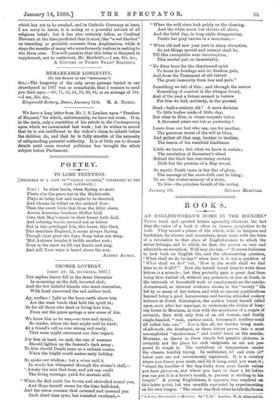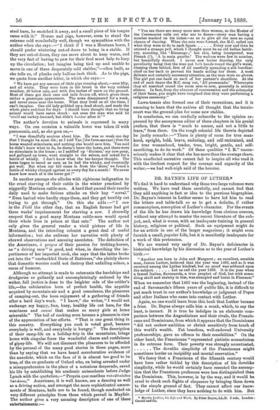BOOKS.
AN ENGLISHWOMAN'S HOME IN THE ROCKIES.* THESE fresh and spirited letters agreeably illustrate the fact that the value of a book is often in inverse proportion to its bulk. They record a phase of life which, with its fatigues and hardships, its alarms and excursions, must come with the force of a revelation to that class of Englishwomen to which the writer belongs, and to which, we fear, she proves so rare and admirable an exception. Well may she say,—" It seems ludicrous to look back on English life, and the oft-recurring question, What shall we do to-day ?' when here it is not a question of What shall we do P' but, How in the world shall we find time to do it all?'" How she herself found time to write these letters is a miracle ; but they probably gain a great deal from being thus dashed off, without any pretence, or aim at finish, in the intervals of household work or employment on the ranche. Accustomed, as internal evidence shows, to the " society " life led by so many of her sisters, and with no special qualifications beyond being a good horsewoman and having attended cookery lectures at South Kensington, the author found herself called upon, soon after her marriage, to undertake the duties of keep- ing house in Montana, at first with the assistance of a couple of servants, then with only that of an old woman, and finally single-handed, "cook, parlour-maid, housemaid, scullery-maid all rolled into one." Nor is this all, for besides being maid- of-all-work, she developed, as these letters prove, into a most accomplished " stockwoman " and useful hand on the rancho. Montana, as drawn in these simple but graphic pictures, is certainly not the place for such emigrants as are not pre. pared to rough it. The variations of temperature render the climate terribly trying. In midwinter, 400 and even 60'a below zero are not uncommonly registered. It is a country where you freeze your meat, and let it hang until you want it ; "where the handles of the hay-forks burn your hands unless you have gloves on, and where you have to thaw a bit before you can put it in a horse's month, to prevent it sticking to his tongue." A young Englishman, it appears, was sceptical oie this latter point, but was speedily converted by experimenting on his own tongue. "The result was that when he felt the frozen * A Lady's Ranche-Life in Montana. By "I. II." London; W. H. Allen and Co.
steel burn, he snatched it away, and. a small piece of his tongue came with it." Horses and pigs, however, seem to stand the extreme cold wonderfully well, though we sympathise with the author when she says :—" I think if I was a Montana horse, I should prefer wintering out-of-doors to being in a stable. If they are out-of-doors, they can move about to keep warm, and the very fact of having to paw for their food must help to keep up the circulation ; but imagine being tied up and unable to move in one of these desperately cold stables,"—often built, as she tells us, of planks only half-an-inch thick. As to the pigs, we quote from another letter, in which she says :—
"We have got any amount of little pigs running about,—over fifty, and all white. They were born in the brash in the very coldest weather, 40 below zero, and with five inches of snow on the ground. Most of them got their ears and tails frozen off, which gives them rather a grotesque appearance. The sows disappeared for a week, and never came near the house. What they lived on all the time, I can't imagine. One old lady gobbled up a dead skunk, and made the whole place redolent for days. I should have thought that no living animal would have eaten skunk : not even the man who said he 'could eat turkey-buzzard, but didn't hanker after it.'"
The author's devotion to animals is expressed in many ways. On one occasion a valuable horse was taken ill with
pneumonia, and, as she goes on,— "I was dreadfully anxious about him. He was so weak one day that I thought he must die; so I told Van [the farm-servant] that the horse wanted stimulants, and nothing else would save him. Van said he didn't know what to do, he daren't leave the horse, and there were no stimulants in the house ; so I saddled up Sinister,' my cow-pony, and galloped up town, went straight to the saloon, and asked for a bottle of whisky. I don't know what the bar-keeper thought. The horse began to mend as soon as he had the whisky, and eventually got well. But when our bill came in from the store,' we found a bottle of whisky charged against us every day for a month ! We never knew how much of it the horse got !"
In another passage she alludes with righteous indignation to the cruel starving of their cattle in the winter practised by niggardly Montana cattle-men. A herd that passed their ranche daily used to make furious attacks on their hay "corral." "Even barbed wire hardly stops them, and they get terribly cut trying to get through." On this she adds :—" I saw in the Field the other day, that an English farmer had got three weeks' imprisonment for starving a cow. I shrewdly suspect that a good many Montana cattle-men would spend their whole lives in prison at that rate." The author not only gives the general reader a vivid picture of life in Montana, and the intending colonist a great deal of useful information ; but she enlivens her narrative with plenty of shrewd observations and amusing anecdotes. The definition of
the Americans, a propos of their passion for trotting-horses, as "a driving race" is good, and when, in describing the im-
pertinence of her imported cook, she says that the latter broke out into the "unshackled Doric of Battersea," she plainly shows that domestic worries could not destroy that unfailing solace, a sense of humour.
Although no attempt is made to extenuate the hardships and drudgeries so gallantly and uncomplainingly endured by the writer, full justice is done to the brighter side of the settler's life,—the exhilaration born of perfect health, the appetite acquired by mountain-air and a good conscience, the pleasures of camping-out, the keen enjoyment of a gathering of friends after a hard day's work. "I know," she writes, "I would not exchange my happy, free, busy, healthy life out here, for the weariness and ennui that makes so many girls at home miserable." The toil of cooking even became a pleasure in view of the appreciation of her efforts. "That is one great thing in this country. Everything you cook is voted good, because everybody is well, and everybody is hungry." The description of their camp-life on a holiday-trip in the mountains, brings home with singular force the wonderful charm and restfulness of gipsy-life. We will not discount the pleasures to be afforded by the perusal of the many good stories in these pages, more than by saying that we have heard corroborative evidence of the anecdote, which on the face of it is almost too good to be true, of the ex-graduate of Oxford who, on being arrested under a misapprehension in the place of a notorious desperado, saved his life by establishing his academic antecedents before Judge Lynch with the quotation,—"Propria gum maribns irravowaki3oro 3ocAciadac." Americans, it is well known, are a dancing as well as a driving nation, and amongst the more sophisticated amuse- ments of Montana, balls are to be found, though conducted on very different principles from those which prevail in Mayfair. The author gives a very amusing description of one of these entertainments :—
"You see there are many more men than women, so the Master of the Ceremonies calls out who are to dance—every man having a number marked on his ticket—so as to give all the men an equal chance of dancing. When the sets were formed, the M.O. called out what they were to do in each figure Every now and then he uttered a strange yell, which I thought must be an old Indian battle- cry, sounding, like Elemengo ;' but this, being interpreted, was French (?), A la main gauche.' The waltzes were few in number, but beautifully danced. I never saw better dancing, the only peculiarity being that the man put both hands round the girl's waist, clasping them behind, first of all carefully spreading a silk handker- chief on her back to prevent his hands soiling her dress. A most delicate and certainly necessary attention, as the men wore no gloves. The girl put one hand on each of her partner's shoulders. At the end of each dance the M.C. sang out, All promenade.' Whereupon they all marched round the room arm-in-arm, generally in solemn silence. In fact, from the absence of conversation and the solemnity of their faces, you might have imagined that they were performing a religions ceremony."
Lawn-tennis also formed one of their recreations, and it is amusing to learn that the natives all thought that the tennis- court was the ground-plan for some new stables.
In conclusion, we can cordially subscribe to the opinion ex- pressed by the anonymous editor of these chapters in his genial preface, that there is "much to amuse, and not a little to learn," from them. On the rough colonial life therein depicted he justly remarks :—" There is plenty of room for true man- hood, upright, bold, brave, enduring, and eolf-reetrained, and for true womanhood, tender, true, bright, gentle, and self- sacrificing, to do its work." Of these qualities "I. R." uncon- sciously makes it clear that she has more than the average share. This unaffected narrative cannot fail to inspire all who read it with the liveliest respect for the courage and capacity of the writer,—we had well-nigh said of the heroine.







































 Previous page
Previous page